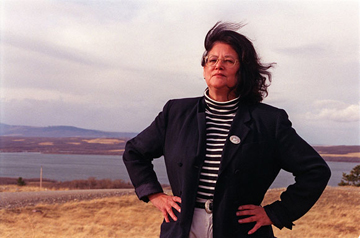
The late Elouise Cobell.
WASHINGTON, DC –– In an appeal filed by Sisseton Wahpeton Oyate member Kimberly Craven of Boulder, Colo., the Cobell trust fund settlement was questioned concerning its fairness to all Indian beneficiaries. The monumental $3.4 billion settlement received congressional approval in December of 2010. The settlement aims to resolve a 15-year lawsuit spearheaded by the late Elouise Cobell, a member of the Blackfeet Nation of Montana, that claims U.S. officials stole or squandered billions of dollars in land royalties meant for Native American tribal members in exchange for oil, gas, grazing and other leases over a century. The number of Native American plaintiffs in the settlement could number 500,000 or more. Craven’s attorney is Ted Frank of the Center for Class Action Fairness. The question presented by Frank concerned what he termed the “fatal flaw” in the settlement, in which not every class member would be fairly compensated by a $1,000 payment. Class members are to receive $1,000 payments or more, depending on the activity of their trust fund accounts and the amount of trust funds they hold. The biggest issue presented to the three-judge panel during the 45-minute hearing on Feb. 15 was whether historical accounting was available to class members and whether these accountings were accurate. Judge David Tatel questioned whether any examination of the trust accounts would sufficiently answer the questions presented by Frank. “You can’t know whether it’s worth $1,000 until you have the actual accounting,” Frank said at the hearing. Members of Congress are not inclined to fund a historical accounting, and in earlier rulings in the case, it was made “crystal clear” that there will be no meaningful historical accounting, according to attorney Adam Charnes of Kilpatrick Townsend & Stockton, who are the class-action attorneys. Charnes is based out of the firm’s Winston-Salem, N.C., office. According to the law firm, the overwhelming majority of potential class members support the settlement. The D.C. Circuit Court of Appeals heard the first appeal of the settlement, which is one of only four appeals filed. These appeals have delayed the distribution of settlement funds thus far. Other notices of appeal also have been filed by a nonprofit group called the Harvest Institute Freedmen Federation and two individuals, Leatrice Tanner-Brown and William Warrior. These appeals could delay by a year or more the disbursement of $1.5 billion to plaintiffs, plus put off reforms and a planned consolidation of fractionated Indian land included in the settlement, according to attorneys for the lawsuit’s plaintiffs. Plaintiffs’ attorneys are asking U.S. District Judge Thomas Hogan of Washington to approve an $8.3 million appeal bond before any appeals can proceed. “This is the largest settlement involving the government in American history, and it resolves egregious breaches of trust that have continued for more than a century,” lead plaintiffs’ attorney Dennis Gingold wrote in an August filing with the D.C. Circuit Court of Appeals. “The settlement is too important to give somebody a free pass at delaying justice.” “Appeals aren’t free for anyone but the government,” said Gingold. Craven also has said the settlement was politically motivated and went beyond the scope of the lawsuit without any input from tribes. “The real aim of the expensive bond is to create an obstacle to my appeal, and Hogan should punish Cobell’s attorneys for making such a bad-faith motion,” Craven said in a letter to the court. “For all of plaintiffs’ threats of seeking sanctions for a frivolous appeal, it is the plaintiffs who have made a frivolous legal argument meriting sanctions,” she said. The next appeal will be heard on May 15. (Contact Karin Eagle at staffwriter@nsweekly.com)
Join the Conversation
